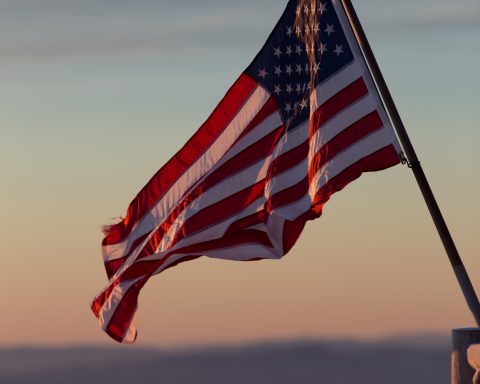Split Votes and Shared Ethos at the General Assembly
The following sermon was preached by Andrew William Smith, ruling elder at First Presbyterian Church in Cookeville, TN, at Covenant Presbyterian Church in Southfield, MI, on Sunday, June 22, 2014, the day after the General Assembly and the day of a dedication of a peace pole in honor of his father, Ken Smith, who died on May 8, 2014. Ken Smith served as President of the Witherspoon Society, now part of Presbyterian Voices for Justice (PV4J), among his other social witness commitments. This sermon has been edited for publication.
Gospel: Matthew 10:24-39
Who We Are

In the sad and surreal days following September 11, 2001, the slogan “United We Stand” proliferated on signs, t-shirts, and bumper stickers. A noble affirmation of national unity, it made strong rhetoric — but it never reflected our full reality.
‘United We Stand or Divided We Fall’ is an either/or construction that suggests: either you are with us or against us; patriot or traitor. As Americans discovered so distinctly in the days and years since, we don’t live in an either/or world.
The same is true in the church. We are divided, to be sure — but from within that brokenness and division we seek a greater unity that only Christ can provide. I believe I saw that deeper unity at my first General Assembly, coming as a full time English professor and part time seminarian.
Some Christians love to imagine the first-and-second-century church, united in close and profound fellowship, equals in the brotherhood and sisterhood called the body of Christ.
But, as I learned in my courses last year at Vanderbilt Divinity School, church history actually tells a different story. Ideological divisions and theological debates have been with us since the beginning; “inspired” can also mean, “intense.”
___________________________________________
Some Christians love to imagine the first-and-second-century church, united in close and profound fellowship, but church history actually tells a different story.
___________________________________________
The harsh words that divide factions within the larger church today often have eerie parallels to much earlier debates that separated the saints, gave meaning to the martyrs, and ultimately established ‘orthodoxy’ over and against the ostracized ‘heretics.’ According to one scholar, we are mistaken when we speak of “early Christianity;” a more accurate description would be “early Christianities.”
 So it is with Presbyterians today. We in the Presbyterian Church (U.S.A.) are one of a cluster of denominations known as mainline Protestants. Although we are the largest group of Presbyterians, our numbers have been in decline for some time. At the end of 2013, we numbered just under 2 million members and just over 10,000 congregations — still a sizable bunch — but in the 10 years from 2003 to 2013, we lost over 600,000 members and over 1,000 congregations. Though most of the decline (across the mainline) is due to low birthrates and people not returning to church after college, some have left because of disagreements with what they perceive as the PC(USA)’s engagement with liberal theology and Left politics.
So it is with Presbyterians today. We in the Presbyterian Church (U.S.A.) are one of a cluster of denominations known as mainline Protestants. Although we are the largest group of Presbyterians, our numbers have been in decline for some time. At the end of 2013, we numbered just under 2 million members and just over 10,000 congregations — still a sizable bunch — but in the 10 years from 2003 to 2013, we lost over 600,000 members and over 1,000 congregations. Though most of the decline (across the mainline) is due to low birthrates and people not returning to church after college, some have left because of disagreements with what they perceive as the PC(USA)’s engagement with liberal theology and Left politics.
I come to you fresh from our biennial national General Assembly, affectionately referred to as “GA,” where some of you helped host on behalf of Detroit Presbytery This week of meetings upon meetings, motions and overtures, amendments and amendments to the amendment, minority reports, main motions, and substitute motions, and — finally — calling the question: this was the Presbyterian C-SPAN. To some it’s boring protocol, but to the self-proclaimed ‘GA junkies’ and their trending Twitter hashtag #GA221, it was more exciting to follow than the World Cup or the NBA finals.
I was what they call a ‘GA newbie,’ but I wanted to be there in honor of GA junkie, Ken Smith, my father, who left this world 45 days ago. Ken’s vigorous commitments to the various movements for social justice within in our church were vindicated this week in Detroit, to a much greater level than he ever saw in his lifetime. I am grateful I shared these days with many of Ken’s old friends and many of my new friends. I served the More Light Presbyterians communications team as an activist-observer, covering the proceedings for marriage equality and maintaining with others on our team the MLP blogs, Facebook, and Twitter presence.
A Big Day at GA
When I woke up Thursday morning, the day of the big marriage vote, my “mind was stayed on freedom,” as I hummed that song I learned from the freedom singers of the early 1960s, lifting up its words for this new civil rights movement whose time has come.

When I woke up Thursday morning, I put on my wedding ring, knowing that the bonds I celebrated and consecrated in a PC(USA) church with my partner who happens to be of a different gender than I am are strong bonds that would be made even stronger if similar bonds may be celebrated and consecrated by the PC(USA) for sisters and brothers whose partners are of the same gender.
When I woke up Thursday morning, I put on my Pentecost clothes, flames of orange and yellow and red, the glowing fire of freedom for our LGBTQ family.
When I woke up Thursday morning, I was reminded by friends that this day was also Juneteenth, a day to celebrate the end of slavery for our African-American brothers and sisters, a day to celebrate the importance of freedom.
___________________________________________
When I woke up Thursday morning, I was reminded by friends that this day was also Juneteenth, a day to celebrate the end of slavery for our African-American brothers and sisters, a day to celebrate the importance of freedom.
___________________________________________
When I woke up Thursday morning, I meditated on the marriage committee meetings where commissioners and delegates spent time carefully adding language to make it clear that we want to comfort and keep those conservative folks in our family that disagree with marriage equality, that we don’t want them to feel like they need to leave our church if marriage equality passes at this assembly. I also meditated on those LGBTQ Presbyterians who have already left our church over the past decades because they felt alienated, excluded, and not sufficiently comforted or reconciled by the actions of previous assemblies.
 When I woke up Thursday morning to the Detroit fog, I waited for the misty night to clear so that we might cling to the day, for it was the day when we as a church would choose whether or not to walk in the light, to ride the winds of change, to declare that the loving marriage bond is between two people, any two people who know and feel it to be true and from God, to declare that this is the joy of being One in the mystery of a love that fills us with a foretaste of heaven.
When I woke up Thursday morning to the Detroit fog, I waited for the misty night to clear so that we might cling to the day, for it was the day when we as a church would choose whether or not to walk in the light, to ride the winds of change, to declare that the loving marriage bond is between two people, any two people who know and feel it to be true and from God, to declare that this is the joy of being One in the mystery of a love that fills us with a foretaste of heaven.
Thursday afternoon, there was both shock and glow at the overwhelming decision by an affirmative vote of 71% of the commissioners to send to the presbyteries for vote a change in the description of marriage in our Book Of Order, one half of the PC(USA) constitution, to inclusively describe “two people” rather than only “one man and one woman.” And yet even as supporters of the change hugged and wept, posted messages to Facebook and Twitter, and gave interviews to NPR, USA Today, and the New York Times – even in that moment – my Mom was quick to remind me that Jesus and Paul advocated singleness of devotion to God and saw marriage as a compromise. We just don’t live in an either/or world.
Division or Disagreement?
Presbyterians are not fully united behind the decisions made for marriage equality – or virtually any other decision that the General Assembly made, including the decision to divest from three companies that do business with the Israeli occupation in Palestine. We are divided over many of the results, and some opponents of these decisions predict the further demise of our denomination because of them.
 But this division is nothing new. It’s not just the varying strands of Presbyterian and Reformed traditions that are divided; it’s not just mainline Protestants or Southerners and Northerners, liberals and conservatives, or whatever distinction you may draw. Baptized Christians from every era and tradition have disagreed about how the Spirit leads us to act in a given time and place.
But this division is nothing new. It’s not just the varying strands of Presbyterian and Reformed traditions that are divided; it’s not just mainline Protestants or Southerners and Northerners, liberals and conservatives, or whatever distinction you may draw. Baptized Christians from every era and tradition have disagreed about how the Spirit leads us to act in a given time and place.
Christians supported slavery in this country, and Christians were abolitionists. Christians opposed women’s ordination, and Christians supported it. Christians opposed the Vietnam War, and Christians supported it. The list is long, and while our faith seeks ethical application, it’s not just the inclusion of lesbian, gay, bisexual, transgendered, queer, and questioning Christians that has us at odds with each other. Climate change, the Middle East, immigrant rights, death penalty, a woman’s right to choose, gun violence… the list could go long. On these and many more issues, one could claim the body of Christ is not united but divided.
___________________________________________
The Book of Order is subordinate to a bigger book, the one we call the Bible. And that book is not so much a constitutional book of orders as it is the story of God’s people, and the coming of a disorderly Savior who overturns tables, socializes with tax collectors and sinners, and breaks bread as a symbol of his broken body, crucified for us.
___________________________________________
As we pray and meditate on the outcome of General Assembly, I am reminded of a debate I heard in the marriage committee and then again on the main floor. A commissioner tried to halt the proceedings not once, not twice, but multiple times, claiming that the overtures were out of order according to Robert’s Rules of Order due to a stipulation on actions that contradict the constitution of a given group.

Photo Credit: LA Times
Our constitutional experts advised us. They reminded us that Robert’s Rules of Order is subordinate to the Book of Order. And, I would say, it goes back much farther than that. The Book of Order is subordinate to a bigger book, the one we call the Bible. And that book is not so much a constitutional book of orders as it is the story of God’s people, and the coming of a disorderly Savior who overturns tables, socializes with tax collectors and sinners, and breaks bread as a symbol of his broken body, crucified for us. The cross breaks down barriers between rich and poor, slave and free, black and white, straight and gay, making as always a way out of no way.
As our constitution reminds us, Christ and Christ alone is the head of the church, not only in Detroit at the General Assembly, but every day, in every age and in the age to come. For it is Christ alone who rules, calls, teaches, and uses the church as he wills. And Christ’s law is love.
We who make up the Church in this world and time are broken like the bread at the table, divided like Christ’s clothes before his crucifixion, and yet we are also united by the cup of salvation, by the waters of baptism, and by the fire of the Holy Spirit moving inside us.
Simil concordo et dissocio; Broken Yet Made Whole at the Same Time
In today’s passage from Matthew, Christ tells his disciples that he brings the sword, openly contradicting other of his more peaceful teachings about loving enemies, turning cheeks, and putting away swords. We are not exempt from sin nor do we always know the mind and heart of God when it comes to discerning God’s will. We are not exempt from our own trials or deaths. As Romans 6:11 reminds us, it is only through death that we experience ultimate reconciliation in the unity of resurrection. The Spirit forces moral choices, and sometimes puts idolatries to the metaphorical sword.
 My father Ken Smith was always a peace activist, but he also was an Eagle Scout and a veteran, who served his country honorably in the National Guard. Always a fellow traveler with Rev. Dr. Martin Luther King Jr., he was also called into the streets to keep the peace with potential force during the unrest that followed King’s assassination.
My father Ken Smith was always a peace activist, but he also was an Eagle Scout and a veteran, who served his country honorably in the National Guard. Always a fellow traveler with Rev. Dr. Martin Luther King Jr., he was also called into the streets to keep the peace with potential force during the unrest that followed King’s assassination.
The Prince of Peace is always, as the Jackson Browne song declares, a Rebel Jesus, a bold Jesus, an audacious Jesus, yes, a courageous Jesus, risking everything, even peace within the family or the church family, risking worldly peace for a peace that passes all understanding. That peace unites the church even in its disagreements. Hence the rough Latin take off on Martin Luther’s description of Christians as “simil justus et peccator” (justified and yet sinner). We are both united (concordo) and divided (dissocio), yet one (unum).
___________________________________________
The Presbyterian Church (U.S.A.) is one that, as I learned this week, has chosen to live in tension with itself, to embrace contradiction and ambiguity as the real cost of following a God who became flesh and dwelt among us.
___________________________________________
The place that we have set at the table to be more inclusive and inviting includes a group of sisters and brothers who have been beaten and bullied, dealt with bigotry and bloodshed, suffered from shame and even suicides. Does Christ call us to promote more of the same shame or does he take the blame for all of us, sinners alike, despite our differences?
 The Presbyterian Church (U.S.A.) is one that, as I learned this week, has chosen to live in tension with itself, to embrace contradiction and ambiguity as the real cost of following a God who contradicts other views of monotheism as God became flesh and dwelt among us and entered into history. This was, is, and always will be a Jesus of action and not of abstraction. This was, is, and always will be a Triune God, a creator, redeemer, and advocate, eternally outside time but always active and acting in time.
The Presbyterian Church (U.S.A.) is one that, as I learned this week, has chosen to live in tension with itself, to embrace contradiction and ambiguity as the real cost of following a God who contradicts other views of monotheism as God became flesh and dwelt among us and entered into history. This was, is, and always will be a Jesus of action and not of abstraction. This was, is, and always will be a Triune God, a creator, redeemer, and advocate, eternally outside time but always active and acting in time.
Our Book of Confessions is a profound example of our church’s evolving witness in the world to the Good News of Jesus Christ through a kind of recursive repentance and progressive proclamation. Over time, we have added to the Book of Confessions, but we have never subtracted from it. This Assembly voted again to send to the presbyteries for vote the Belhar Confession, with its roots in the repentance of racism and struggle against apartheid in South Africa. That is, with these accumulating confessions, the PC(USA) is reformed and always being reformed, always moving and always on the move, never stagnant or stationary, sometimes stumbling, sometimes growing weary, but ever yet finding the wings to fly, the strength to run, to finish the race.
My Daddy ran his race to the finish, running marathons and then running to stand still in his struggle with Parkinson’s, running with Jesus Christ his savior and King, always living in abundant hope, to the Glory of God. Amen
*****
AUTHOR BIO: Andrew William Smith is an English professor by day and DJ by night who works as the Faculty Head of the Tree House environmental living and learning village at Tennessee Tech. He’s an activist, poet, blogger, ruling elder in the PC(USA), Vanderbilt seminarian, and aspiring preacher. He blogs at http://unlikelysundayschool.blogspot.com/ and teacherontheradio.blogspot.com. Follow Andrew on Twitter @presbyhippy.






Unbound Social